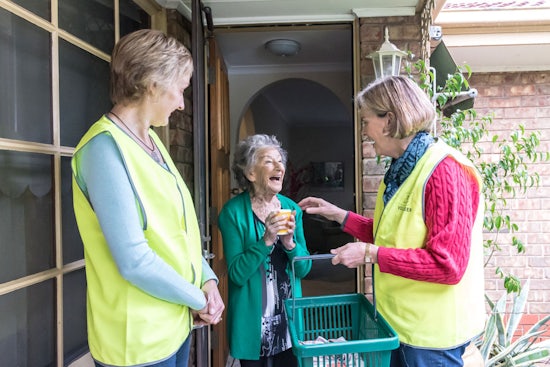Meals on Wheels calls for vital government funding in the next Budget
Australian Meals on Wheels Association (AMOWA) is calling on the Federal Government for $5million to relieve some of the financial pressures on the organisation, which is funded mainly by its users.

Gwenda Ruse, of Lower Mitcham, with volunteers Louise Retallack (left) and Erica Griffen (right)
Each year, around 75,000 Meals on Wheels volunteers deliver more than 10 million hot meals to over 120,000 older Australians throughout the country.
Sharyn Broer, Secretary of AMOWA and Chief Executive Officer Meals on Wheels SA highlights Meals on Wheels food is designed specifically for older people and meets at least one third of their daily intake. “There’s more protein and energy and less sugar than the usual commercial ready-made meals,” she says.
She says food safety, increases in utilities, fluctuation in fuel prices and the resulting volunteer out-of-pocket expenses is escalating at a much faster rate than the government funding.
“We have to recruit, train, induct and reimburse our volunteers,” says Ms Broer. “Changes to work health and safety regularity requirements, because volunteers are included as workers under the act, cost another $250,000 in paperwork.”
Ms Broer points out in SA, customers pay $9 for each three course meal, delivered hot to their door at lunch time. “For those reliant on the aged pension, that’s 10% of their weekly income, and up to 15% for couples,” she says. “The government contribution is less than $3.”
She highlights the service is more than just delivering a hot meal. “It’s social interaction and making sure the person is save and well,” she says. “Our volunteers experience a whole range of conditions in the people they visit; mobility issues, some can’t plan shopping lists or remember their food because they have cognitive problems. We give peace of mind to the family the person is seeing someone that day.”
Ms Broer says when affordability becomes an issue, people eke out their midday meal across the day, couples share a meal, or people cut back on or cancel their deliveries altogether. “They eat less food, and less nourishing food, making it more likely that they will spend time in hospital,” she says. “Those who are more socially isolated report higher levels of loneliness when Meals on Wheels support is reduced.”
At the National Meal Guidelines launch in Canberra, President Nelson Mathews highlighted the funding uncertainty and importance of volunteers to the service.
“It’s true to say, that in some cases volunteer resources are stretched – which is why we are currently agitating for proper and appropriate funding,” he says. “The same work ethic and commitment that ensures that last year during an electricity blackout in SA not one person missed out on a meal, or during floods in TAS volunteers moved heaven and earth to ensure people were fed applies every single day.”
Mr Mathews is calling on the Government to acknowledge the health outcomes achieved by Meals on Wheels and the downstream savings generated and the provision of realistic and appropriate funding to create certainty about the future of MOW in Australia.
“We want $300,000 to ensure AMOWA has the resources to work effectively with the Gov. to deliver the necessary reforms to come and streamline the administrative overheads to MOW and Government. Note: As board members some of us get paid by our State bodies to participate, others simply volunteer all their time,” he says.
He is calling on the Government to provide an increase in base funding for MOW services of $5 million dollars (an average of .50c a meal) in the 2017 budget . This he says will relieve pressure on volunteers, stop many services operating at a deficit, address funding inequities, and avoid unaffordable price-hikes for those who can least afford it.























